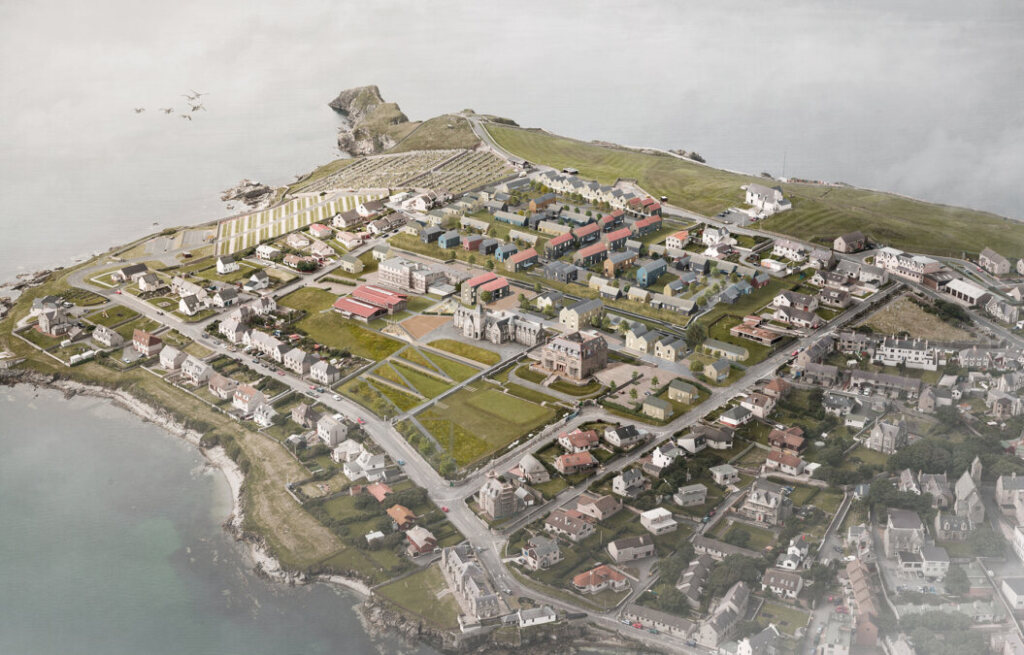Council criticised for poor track record on projects going over budget – including £2.4m extra needed for Knab demolition

Auditors have criticised the SIC’s poor track record in completing projects on time and to budget – highlighting the huge rise in costs for the old Anderson High School demolition as a recent example.
Deloitte’s report noted the increase in costs for the Knab redevelopment in Lerwick risked the council’s ability to demonstrate value for money.
As reported in January, the SIC had to approve an additional £2.4m of funding for the demolition phase of the project, after its original estimates of £1m were found lacking.
Deloitte’s report compared the blunder with the controversial acquisition of SLAP, which auditors found was overvalued by £1.5m and the delayed Shetland College merger.
It report also warned that the SIC’s history of project “slippage”, together with challenges posed by Brexit and the pandemic, meant capital projects planned for the coming years which include road works, ferry replacements as well as the Knab redevelopment, were at risk of being “unachievable”.
The Knab project, which aims to create “future fit” housing as well as recreational resources, business space and a creative industries hub, has been touted as biggest piece of work the council will oversee over the next decade.
The first phase of demolition began in May, with the remainder set to get underway later this year.
However, Deloitte questioned how the SIC’s business case into the demolition got it so wrong.
The full costs of more than three times the initial estimate only emerged after a detailed assessment was carried out into the size of the buildings to be demolished.
The auditors asked why this had not been done to begin with.
The report said failure to do so “raised questions as to the effectiveness of the council’s use of business cases to underpin decision making”.
As a result, the project’s payback period has been revised to longer than nine years – compared with the four years in which it was initially envisaged.
Deloitte said that even the revised savings estimate could not be relied upon, given the inaccuracies with the initial costing model.
It added that members, while supportive of the project, had raised concerns over the rising costs they had been asked to approve in January.
They also felt “there was no other option than to accept the decisions made by management given that the original business case had been approved”.
While the report noted many improvements in other areas of council business, it also highlighted “numerous examples” in recent years of the council making decisions based on business cases that ultimately turn out not to be implemented as agreed.
It said these delayed savings, led to additional costs and undermined the effectiveness of decision making and scrutiny within the council
The SIC’s audit committee chairman Allison Duncan asked Deloitte’s Conor Healy to explain the possible impact on capital projects when the report was discussed at a meeting on Wednesday.
Mr Healy explained the council had a “history of slippage” with its projects and, while this had improved in recent years, there were now additional threats posted by Covid-19 and Brexit,
While the full extent of the problems are not yet known, Mr Healy said Brexit was beginning to affect the availability of labour and cost of materials, which could see projects become more expensive going forward.
“So, essentially, it’s based on the historical performance of the council, plus two macro economic factors that are creating that level of uncertainty,” he said.
“We are not saying it’s undeliverable, we are saying there’s a risk it’s unachievable and basically requires close monitoring over the coming years.”
The SIC’s Jamie Manson said the council had reviewed its capital programs recently and pushed back on areas where it was felt there may be constraints.
Mr Manson also noted lots of work had already been deferred from last year due to the pandemic and that would impact on future years.
He noted a recommendation to look back at previous businesses cases to compare what had been sought with what was actually achieved.
“That should help identify lessons learned that we can apply in future business cases to reduce the optimism bias, financially but also on the time taken.”
Despite the challenges around business cases and project slippage, Mr Healy said the audit report found many areas of improvement compared with previous reviews, with far fewer recommendations required and much better engagement,.
Mr Duncan said it was the one of the best reports he had seen since joining the council in 2007.
While acknowledging there were “positives and negatives” he said he was “very encouraged” by what he read.








NO COMMENTS
Add Your Comment